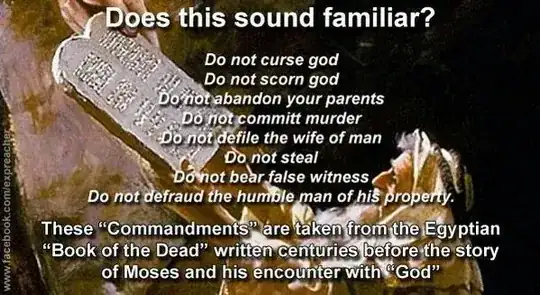Grabbing the following conclusions from Jared C. Hood, "The Decalogue and the Egyptian Book of the Dead", Australian Journal of Jewish Studies, Vol. 23 (2009).
Does it take literary dependence for two cultures to arrive at similar statements regarding something as fundamental as the injustice of murder? Leaving aside thoughts of the evolution of morality, what parents in the history of humanity have not said to their child, “Do not do it,” or “Do what I say”?
[...]
From that emerges what is probably one of the major differences between the two documents. Both have the concern of self-interest—the concept of blessing upon obedience and a curse upon disobedience—and both have a theocentric focus, with the idea of pleasing God/the gods (in the protestations of the second recitation, the claim is that “I have done what people say and that on account of which the gods are pleased”). The Egyptian text, though, is more focused on magic and merit (or having maintained order or balance), whilst the situation with the Israelite text is more complicated. The Decalogue comes to a people who have already been redeemed. The justice of God is preceded by the covenant love of God. The Spell is concerned to find a way for “absolution” for sin, whereas the Decalogue is to be kept from the security of being in a special relationship with the Lord. In fact, the overall tenor of the relationship between the individual and the deity in Egyptian and Israelite religion is different, since in the latter, all are priests of God and are in a Father-son relationship (the democratising of religion, as it has been put).
Short version: What the two documents share is basically being a list of bad things, which is hardly a brilliant and unique creative product. What is unique and innovative to the Bible is that the Ten Commandments come as an explanation of part of a covenant by which an entire tribe has been divinely selected. The Egyptian text doesn't have this at all, being part of a magic spell for the individual.
